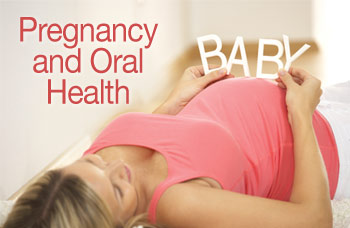Pregnancy and Oral Health
Everything You Always Wanted To Know — But Never Knew To Ask

Pregnancy is generally thought of as the time when a woman strives to be particularly aware of the need for “health” and what must be done to achieve the highest degree of well-being for her and her developing child. Most importantly, many women may not be aware of the link that exists between their oral health and their systemic (general) health, as well as the impact that other factors can have on a developing child.
Despite these goals, neglecting dental health is not uncommon during pregnancy. The difficulty faced in maintaining satisfactory oral and dental health seems understandable when one considers the often frequent bouts of nausea experienced; the physical demands and restraints imposed by weight gain and a growing abdomen; the problems presented by sensitivity and inflammation related to the gum tissues, so-called pregnancy gingivitis; and concerns, albeit unfounded, that certain aspects of dental treatment may be dangerous to the developing child. This article will explore these important issues.
Important new information suggests that parents and their oral health may have a significant influence on the development of tooth decay in their children...
Unhealthy Mouth, Unhealthy Body
Once thought to be exclusively localized to the gum tissues, periodontal (gum) diseases and their associated bacteria are now thought to be involved with other systemic (general body) conditions such as cardiovascular disease, heart attacks and strokes, diabetes mellitus (disease caused by highly elevated blood sugar levels) and respiratory diseases. Recent studies have suggested that oral bacteria and their bi-products have the ability to cross the placenta — the special organ that allows the transfer of nutrients and other important factors that sustain and promote growth of the developing baby. Passage of these bacterial products can affect the fetus (developing baby) by stimulating an inflammatory response in the mother, which may ultimately result in preterm (premature) delivery (PTD). PTD is defined as birth before 37 weeks of pregnancy and is also associated with low birth weight (LBW). These associations make it imperative for women who are pregnant to maintain optimum oral health and seek regular dental care.
Healthy Mind — Healthy Body
Most all women who are, or may be thinking of conceiving have the presence of mind to visit their internist, gynecologist and/or obstetrician. The medical profession is beginning to assume a role in the education of pregnant women about their oral health. And dental professionals, including the pediatric dentist (specialists in children's dentistry), are playing an active role in transferring current knowledge on this subject to expectant mothers not only to minimize the risks of preterm delivery, but more importantly to help ensure the health and well-being of both mother and baby “to be.” It is also important in light of today's knowledge for expectant mothers to visit their dentist or pediatric dentist, as we shall see.

